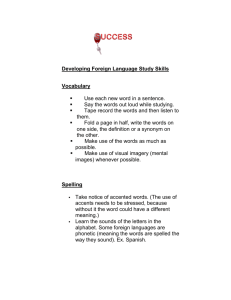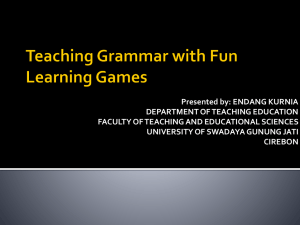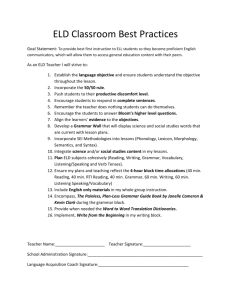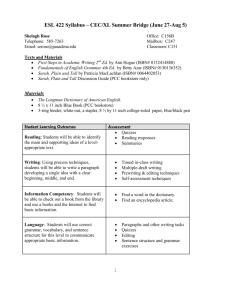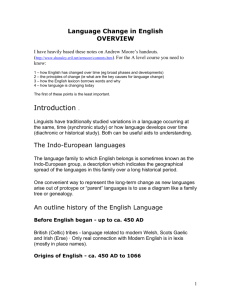A test score…
advertisement
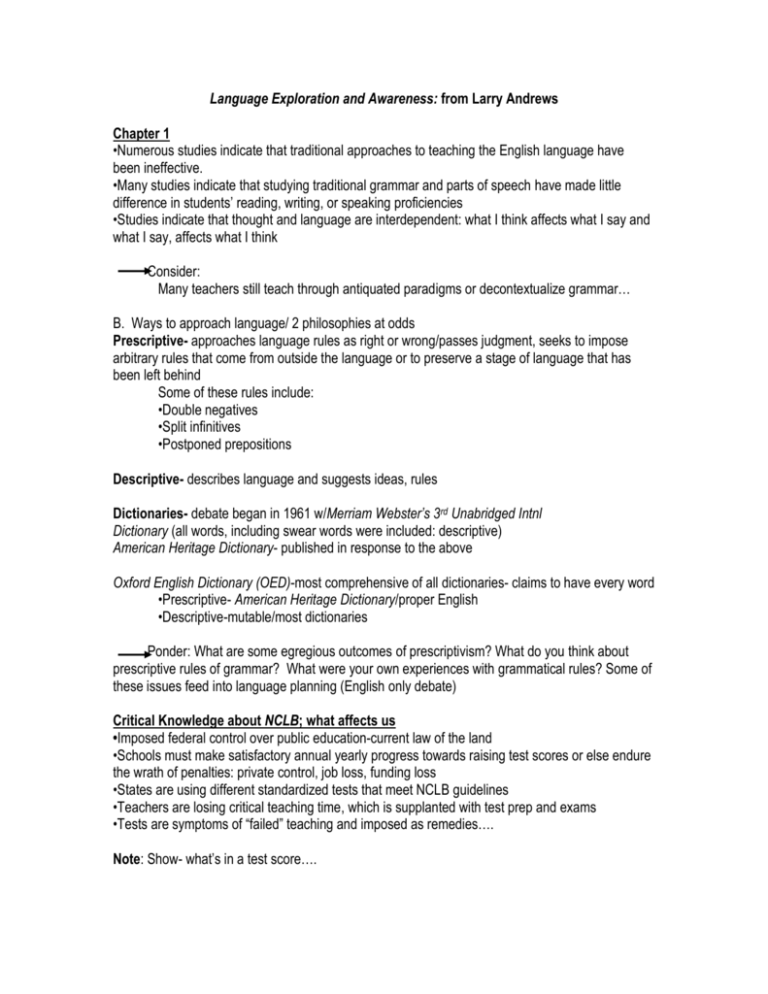
Language Exploration and Awareness: from Larry Andrews Chapter 1 •Numerous studies indicate that traditional approaches to teaching the English language have been ineffective. •Many studies indicate that studying traditional grammar and parts of speech have made little difference in students’ reading, writing, or speaking proficiencies •Studies indicate that thought and language are interdependent: what I think affects what I say and what I say, affects what I think Consider: Many teachers still teach through antiquated paradigms or decontextualize grammar… B. Ways to approach language/ 2 philosophies at odds Prescriptive- approaches language rules as right or wrong/passes judgment, seeks to impose arbitrary rules that come from outside the language or to preserve a stage of language that has been left behind Some of these rules include: •Double negatives •Split infinitives •Postponed prepositions Descriptive- describes language and suggests ideas, rules Dictionaries- debate began in 1961 w/Merriam Webster’s 3rd Unabridged Intnl Dictionary (all words, including swear words were included: descriptive) American Heritage Dictionary- published in response to the above Oxford English Dictionary (OED)-most comprehensive of all dictionaries- claims to have every word •Prescriptive- American Heritage Dictionary/proper English •Descriptive-mutable/most dictionaries Ponder: What are some egregious outcomes of prescriptivism? What do you think about prescriptive rules of grammar? What were your own experiences with grammatical rules? Some of these issues feed into language planning (English only debate) Critical Knowledge about NCLB; what affects us •Imposed federal control over public education-current law of the land •Schools must make satisfactory annual yearly progress towards raising test scores or else endure the wrath of penalties: private control, job loss, funding loss •States are using different standardized tests that meet NCLB guidelines •Teachers are losing critical teaching time, which is supplanted with test prep and exams •Tests are symptoms of “failed” teaching and imposed as remedies…. Note: Show- what’s in a test score…. It is important to keep in mind though that tests are culturally and economically biased and that the achievement gap is a (Kirkland, 2010) construct that was designed to demonstrate and normalize the myth that non-White and poor students do less well on standardized tests compared to White students. As the gap has gained more power structurally, it has been used to justify the value of dominant ideologies of middle and upper-class Whiteness in schools. In order to develop a true picture of what any test score really means, results should be disaggregated, read over time, account for background and schooling experiences, and examined cumulatively and holistically. What numbers represent Stakeholders’ dreams for replenishing the economy Values of the dominant social and ethnic classes Sociocultural deprivation Cumulative neglect of motivation Prior practices of teachers How home effects self-perception Any type of neglect or abuse Internalized inferiority complex Stereotype threat-negative self concept What it doesn't represent Truth or reality Hope Intellectual Capacity Research that claims standardized testing is biased The full picture of a student Student success in school A student’s potential to do well in college or life Sociocultural or multi-class values Who it represents White, middle class students and who have resources or access to them A test score… Who it doesn’t represent Non-white students Students from impoverished backgrounds or who lack resources The majority of students Students whose first language is not English Teachers’ best practices Language Exploration Awareness (LEA) Organic approach to teaching English --Activities that emphasize meaning- learning should be approached contextually (grammar, issues, writing) --Uses authentic language found in society- examples that are relevant and timely (real life issues) --Developmental view- language is a work in progress --Activities develop awareness of several aspects of language --Activities are student centered and inquiry oriented (stay away from lecturing) --Activities require active reflection and critique—these are critical skills Defining Good English-marked by success in making language choices so that the fewest number of people will be distracted by the choices; •appropriate to the speaker/writer’s purpose •appropriate to the context •comfortable to both the speaker and listener when we say something that seems out of line, we pay a social tax- levied against those who violate society’s norms and expectations Andrews recommends that you should pay attention to this grammar list…aim for mastery of key grammatical norms- these 20 represent the most frequently occurring in written language: What would you add or subtract? Intro grammar activity for next week…. Do Now: Define grammar


